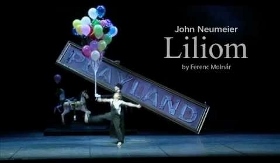IF I LOVED YOU
At a time when many ballet companies are commissioning short dance pieces, it’s refreshing that John Neumeier—since 1973, when he became Artistic Director and chief choreographer of the Hamburg Ballett [sic]—continues to develop story ballets. His latest sweeping narrative which arrived at Segerstrom Hall last night is Liliom, based on Ferenc Molnár’s 1909 play, which, for those who don’t know, was also the 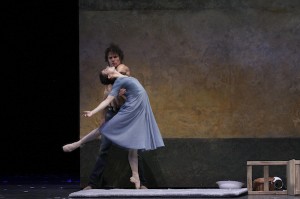 source material for one of the greatest musicals of all time: Rodgers and Hammerstein’s Carousel (1945).
source material for one of the greatest musicals of all time: Rodgers and Hammerstein’s Carousel (1945).
For this version, Neumeier, who commissioned the score from Academy award-winning composer Michel Legrand, refashioned the libretto after Molnár. Even with an overly long first act (100 minutes), a mostly derivative score, and some glaringly opaque storytelling, Neumeier is to be credited for finding the heart of this tragic love story; the themes remain timeless, and you will be touched. Don’t expect groundbreaking, soaring, or particularly distinctive choreography; instead expect a mash-up of classical and Broadway, and among the confusing narrative some astounding imagery courtesy of imaginative design integrated with the finest of dance actors.
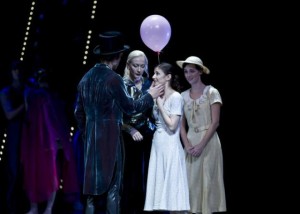 The story here follows Liliom (Carsten Jung), a gorgeous, cocky roustabout carousel barker who falls in love with a young and innocent waitress, Julie (Alina Cojocaru). Liliom is fired by the carousel’s jealous owner Mrs. Muskat (Anna Laudere), and remains unemployed. While Liliom can be gentle, he abuses and even strikes Julie in his frustration. He commits suicide after a botched robbery attempt, leaving Julie with their unborn child. After 16 years in a sort of purgatory, Liliom is allowed to return to earth to do a good deed, but when his troubled, lonely, and belligerent teenage son Louis (a gloriously expressive Aleix Martinez) refuses to take a star Liliom has stolen for him in heaven, the father hits him. Before returning to the afterlife, Liliom finally declares his love to Julie, something he had never done in life. The real tragedy occurs when Julie forgives and fondly remembers Liliom, interpreting his beatings as caresses.
The story here follows Liliom (Carsten Jung), a gorgeous, cocky roustabout carousel barker who falls in love with a young and innocent waitress, Julie (Alina Cojocaru). Liliom is fired by the carousel’s jealous owner Mrs. Muskat (Anna Laudere), and remains unemployed. While Liliom can be gentle, he abuses and even strikes Julie in his frustration. He commits suicide after a botched robbery attempt, leaving Julie with their unborn child. After 16 years in a sort of purgatory, Liliom is allowed to return to earth to do a good deed, but when his troubled, lonely, and belligerent teenage son Louis (a gloriously expressive Aleix Martinez) refuses to take a star Liliom has stolen for him in heaven, the father hits him. Before returning to the afterlife, Liliom finally declares his love to Julie, something he had never done in life. The real tragedy occurs when Julie forgives and fondly remembers Liliom, interpreting his beatings as caresses.
As with Hammerstein, Neumeier also Americanizes the story but sets it in a Depression Era fairground. The subplots involve Julie’s best friend, Marie (Leslie Heylmann), who marries hotel porter Wolf (Konstantin Tselikov), later becoming 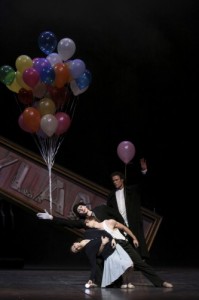 wealthy with him; and Ficsúr (Dario Franconi), a lowlife criminal who entices Liliom to thievery.
wealthy with him; and Ficsúr (Dario Franconi), a lowlife criminal who entices Liliom to thievery.
In the enigmatic and unnecessary prologue, The Balloon Man (the spindly but agile Sasha Riva) slowly crosses the stage—but what is this being? Are the colorful balloons symbols of ephemeral happiness which can burst in a moment? The ensuing scene involves Liliom’s return to earth when he meets his son, and there is some lovely intertwining between the trio of family members and The Balloon Man in a dilapidated “Playland,” but the same scene is repeated at the end of the 155-minute evening. It’s unclear why Neumeier makes this a memory ballet, but the entire prologue should be excised as those unfamiliar with the story will be baffled. Plus, it negates the shocking moment when Liliom stabs himself after his bungled crime; the same mistake was made in the film version of Carousel.
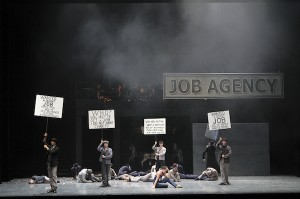 The following seven scenes that make up this enormous production are almost cinematic in nature. A series of dances, a combination of balletic steps (such as en pointe work) and 1930s pastiche movement, is punctuated by moments of dramatic stillness. The opening, with neon arabesques floating over the three-horse carousel, represents why the ensemble scenes contain the evening’s best choreography: A gaggle of girls fawning over Liliom, Chinese plate-twirlers, harem dancing girls, and a clown all frame the introduction of well-developed characters. Later, in front of a job agency, the corps de ballet is truly thrilling as unemployed men competing for work, even as they call to mind grownup Newsies.
The following seven scenes that make up this enormous production are almost cinematic in nature. A series of dances, a combination of balletic steps (such as en pointe work) and 1930s pastiche movement, is punctuated by moments of dramatic stillness. The opening, with neon arabesques floating over the three-horse carousel, represents why the ensemble scenes contain the evening’s best choreography: A gaggle of girls fawning over Liliom, Chinese plate-twirlers, harem dancing girls, and a clown all frame the introduction of well-developed characters. Later, in front of a job agency, the corps de ballet is truly thrilling as unemployed men competing for work, even as they call to mind grownup Newsies.
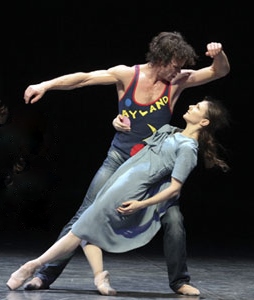 This scene also highlights the abundance of character-specific work: The men execute rough-and-tumble activity with fish-dives and ground rolls. But out of character, Liliom enters dressed in jeans and a Playland tank-top; he looks like a denizen of Venice Beach in the 1990s, and the anachronistic costume is jarring. Back and forth it will go: Beautiful, senseless, touching, repetitive, beautiful, senseless, touching, repetitive.
This scene also highlights the abundance of character-specific work: The men execute rough-and-tumble activity with fish-dives and ground rolls. But out of character, Liliom enters dressed in jeans and a Playland tank-top; he looks like a denizen of Venice Beach in the 1990s, and the anachronistic costume is jarring. Back and forth it will go: Beautiful, senseless, touching, repetitive, beautiful, senseless, touching, repetitive.
The streamlined Act II is much tighter and contains the more arresting stage pictures: A plaintive, forlorn Julie among wedding party revelers; amidst light-bulb stars, a pandemonium of devils in red velvet gleefully awaiting Liliom’s fate at the hands of the Gatekeeper of the Beyond (a rapturous Edvin Revazov); and through a blue-sky portal, a bare-chested Liliom watches his anguished son attempting to bond with Julie.
The role of Julie was created for Royal Ballet’s Alina Cojocaru; her sweet demeanor conveys Julie’s pureness and innocence. Hamburg Ballett’s star player Carsten Jung is muscular, unpredictable, and fiery as Liliom, adding an underbelly of vulnerability. All of the pas de deux flow smoothly, and their incredibly long duet 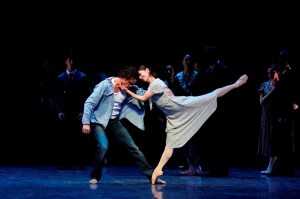 requires a strength and endurance rarely called for.
requires a strength and endurance rarely called for.
Except for a sumptuously heartbreaking 5-note love theme, Legrand’s music disappoints. The orchestrations are lush but the melodies are not. There is inventive work as the orchestra (on tape here) is joined by a live jazz band on stage, which is effective when the jazzy riffs add a disturbing undertone to the wedding’s waltz music. But in trying to duplicate 1930s American jazz, Legrand offers instead a 1970s-sounding jazz waltz or a slinky smooth 1980s swing. The era may be the Thirties, but Legrand (who was in attendance at the opening) should have made the music timeless.
What we’re left with is theatrical magic wrapped up in vague expression of story and character. It’s akin to being loved by a sexy mate only to be smacked in the face. Not only the leads but the entire ensemble are dancers with strong dramatic personalities, but a rich inner life and facial emotion doesn’t reach the back of the  house, and it is Neumeier’s task to ensure that the choreography conveys feeling and elucidates plot, which it fails to do more times than it should in the latter.
house, and it is Neumeier’s task to ensure that the choreography conveys feeling and elucidates plot, which it fails to do more times than it should in the latter.
The exact strengths and weaknesses occurred in Neumeier’s The Little Mermaid (presented exactly one year ago at Segerstrom), but Liliom is far more successful at grabbing our hearts, and therefore a far more enjoyable experience. “Liliom” is the Hungarian for lily, and the slang term for “a tough.” The toughest thing about this ballet is watching how simultaneously close and far Neumeier is to getting it right. As director and designer in all but set, Neumeier is simply wearing too many hats and can’t see the forest for the trees.
photos © Holger Badekow / Hamburg Ballett
Liliom
The Hamburg Ballett
Segerstrom Hall
600 Town Center Drive in Costa Mesa
scheduled to end on February 9, 2014
for tickets, call 714.556.2787 or visit www.SCFTA.org
